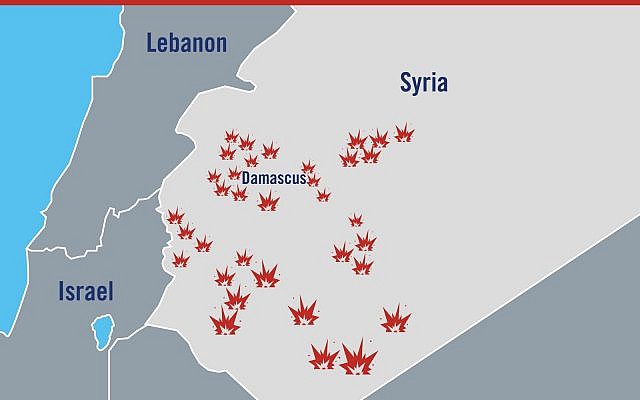Prime Minister Benjamin Netanyahu said Israel was taking action against arms manufacturing in Lebanon and threatened continued fighting with Iran Sunday.
Netanyahu’s stark threat against Lebanon came after Israeli officials have warned repeatedly that Iran may be trying to manufacture advanced missiles in Lebanon to be used against Israel by the Hezbollah terror group.
“We are working to prevent Iran from obtaining nuclear weapons. At the same time we are working against the establishment of an Iranian military presence against us; to this end we are also operating against the transfer of deadly weapons from Syria to Lebanon or their manufacture in Lebanon. All of these weapons are for use against the State of Israel and it is our right – based on the right of self-defense – to prevent their manufacture or transfer.”
Netanyahu did not specify what action was being taken against the arms in Lebanon.
Israel has reportedly carried out dozens of airstrikes against targets in Syria, including Iranian military installations, but has mostly refrained from carrying out attacks in Lebanon, where Hezbollah is a major player in the country’s government.
Last week, Israeli air force head Amiram Norkin showed visiting generals a picture of an Israeli F-35 stealth fighter flying near Beirut, in what was seen as a direct message to Hezbollah.
Hezbollah leader Hassan Nasrallah responded Friday, saying his group did not want a war but would “assuredly win” one.
Israeli officials believe that Iran, failing to effectively transfer weapons to Lebanon via the so-called Shia crescent, is looking to manufacture the arms in Lebanon.
Israel fought a punishing war with Hezbollah in 2006. Jerusalem believes the group has since re-armed with tens of thousands of missiles that can threaten the whole country, but lacks guided missile technology.
In recent weeks, Israeli officials have also warned that Lebanon could suffer if Israel takes action against Hezbollah.
The Iran-backed terror group’s political arm has seen its political fortunes rise in recent years, including in a recent election that pit the group as prime minister Sa’ad Hariri’s main rival.
Israel has also consistently warned that Iran, while helping its ally Bashar Assad fight a longstanding insurgency in Syria, has been working to establish a powerful military presence in the country.
Netanyahu told his cabinet meeting that the fighting with Iran, which has calmed in recent days, was not over.
“The Tehran regime is the main factor undermining stability in the Middle East,” Netanyahu said at the start of the weekly cabinet meeting at his office in Jerusalem. “The campaign against its aggression has not ended; we are still in it.”

The prime minister also revealed he had personally thanked US Secretary of State Mike Pompeo for Washington’s firm stance against Iran over its nuclear weapons aspirations and missile program.
“I spoke with US Secretary of State Mike Pompeo and I said to him that I thank him for the approach that the US is presenting against the Iran nuclear deal, and against the Iranian aggression in our region,” Netanyahu said.
Last week, Pompeo delivered an address laying out US demands for Iran for sanctions releif in the wake of the nuclear deal pullout, including ending destabilizing activity in the region and making threats against Israel.
Pompeo specifically threatened to “crush” Iran proxies such as Hezbollah.
The Palestinian Islamic Jihad terror group vowed Sunday to avenge the deaths of its members who were killed earlier in the day when Israel struck a post manned by the group in the Gaza Strip.
An Israeli tank fired at the Islamic Jihad position in response to an explosive device which had been planted along the Gaza border fence.
“We will not give up our duty to the blood of the martyrs shed by the occupation, and we know how to respond to this dangerous escalation,” Islamic Jihad said in a statement.
According to the Hamas-run Gaza health ministry, three people were killed in the Israeli strike, near the city of Rafah in the southern Gaza Strip. One was itiniaitlly listed as seriously injured but later died of his wounds
The Gazan health ministry identified those killed as Hussein al-Amour, 25, and Abdul Haleem al-Naqa, 28.
The Israel Defense Forces said the improvised explosive device, hidden inside a pair of bolt cutters, was placed along the security fence on Saturday.
“Its goal was to injure the [IDF] troops operating in the area. It was neutralized this morning by the IDF,” the army said.
The army used a robot to detonate the explosive under controlled conditions.
The Islamic Jihad post that was targeted in the tank strike overlooked the portion of the fence where the IED had been planted.
In general, the IDF targets Hamas positions in response to attacks or attempted attacks from the Gaza Strip, as the terrorist group rules the coastal enclave.
The targeting of the Palestinian Islamic Jihad position likely indicates that the army had specific intelligence that the Iran-backed group was behind the attempted IED attack
Sunday morning’s exchange was the latest in a series of cross-border incidents over the weekend.
Late Saturday night, Israeli aircraft carried out a series of strikes against Hamas positions in the southern Gaza Strip late Saturday night, following a border breach earlier in the day, the army said.
No comments:
Post a Comment